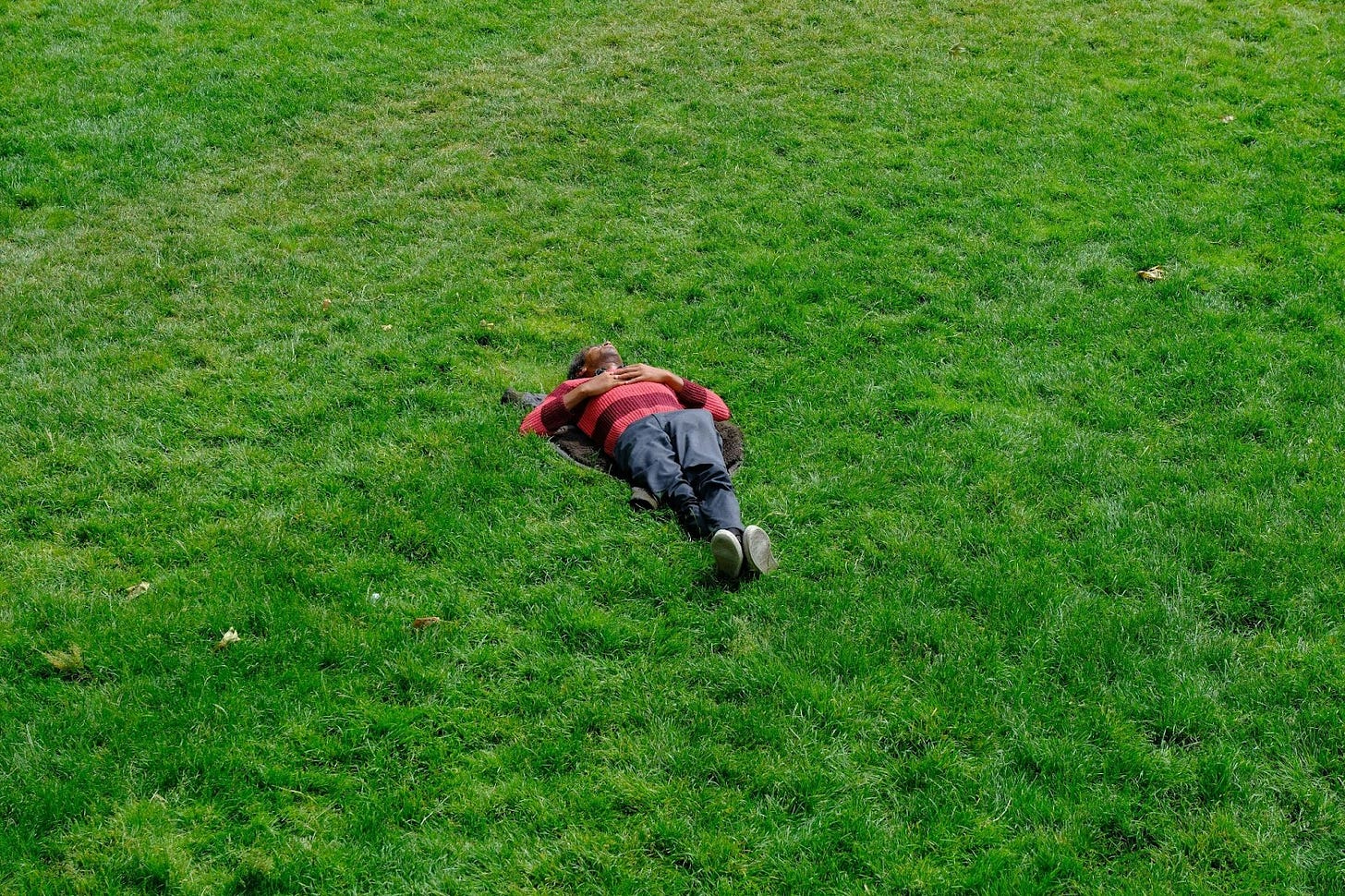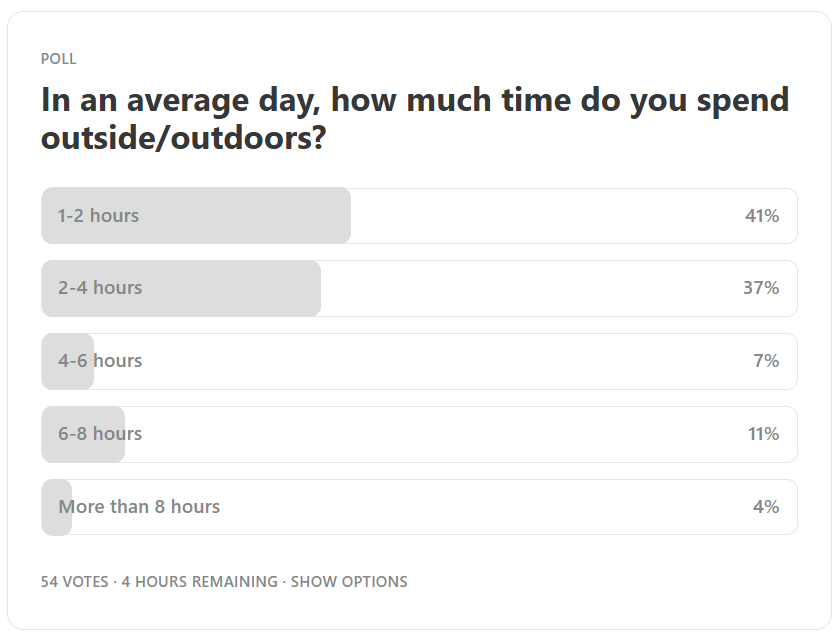Touch Some Grass
You probably aren't doing that enough
Photo by Antoine Pouligny on Unsplash
On an average day, how much time do you think you spend outside? I asked folks in this community that question in a poll yesterday, and here are the results.
Either this group is very outdoorsy, which I wouldn’t be surprised at because folks interested in degrowth tend to be more attached to nature; or you are all lying. The average of the population in developed markets is about 1 - 2 hours per day. The group that reads this blog is well above that.
I came across a stat recently that I thought had to be wrong. It was from Andy Hines’ book - Imagining After Capitalism. (I talked about the book here, if you are interested). The stat said that the average American spends 90% of their time indoors.
That sounded wrong. So, I looked it up. It was correct.
A 2018 study surveyed around 16,000 people across 14 countries in North America and Europe, found that people think that they spend about two-thirds of their time inside (about 67%), but that they actually spend about 90% of their time indoors.
A number of different studies found that people in developed countries spend about 22 hours inside every day.
One in six respondents to the YouGov survey mentioned above, say that they practically never go outside, spending up to 24 hours a day indoors.
The bare minimum we need to go outside is about 10 - 20 minutes per day to properly set your circadian rhythms. It is suggested that exposure to sunlight first thing in the morning helps to set our internal clocks, reduces morning grogginess and supports better sleep. Of course, more than just 10 - 20 minutes per day is recommended (with appropriate sunblock and weather protection of course). The air outdoors is usually cleaner; you get the benefit of nature.
Benefits of being in nature.
Those mountebanks at the US National Parks Service also claim that being out in nature has added health benefits. Dubious, I know.
According to the US National Park Service, nature makes you:
Smarter
Just 20 minutes in nature improves concentration and reduces the need for ADHD and ADD medications in children. Walking through nature also improves cognitive function and memory.
Stronger
Exercising in nature leads to greater health benefits than performing the same activity indoors. Individuals are more likely to repeat being physically active when the exercise is performed in a natural environment. Communities that are closer to nature are more likely to have stronger ties with their community members.
Healthier
A 30-minute visit to a park can improve heart health, circulation and lower cholesterol, blood glucose, and blood pressure. Walking in nature reduces inflammation and boosts your immune system, which decreases the risk of certain diseases and cancers. Interacting with a green space increases social interactions which can prevent diseases like dementia.
Listening to birdsongs and observing animals in nature have shown to promote wellbeing, reduce stress, improve mood, and reduce attention fatigue. Natural aromas from wood and plants have calming effects and viewing nature reduces mental fatigue.
Happier
5 minutes walking in nature improves mood, self-esteem, and relaxation. Frequent exposure to nature reduces anxiety and depression, while promoting a sense of wellbeing and fulfillment. Physical activity in a green space can reduce stress and lowers cortisol levels by 15%.
More Productive
Physical activity in a green space can improve cognitive control, short and long-term memory and overall brain function. Children who walk 20 minutes in a park concentrate in school longer and have better participation. The mental and attention restoration achieved from walking in nature can improve performance on tasks in school and at work. Exercising in nature leads to greater health benefits than performing the same activity indoors.
Charlatans.
Being in nature helps you value nature.
It is no great surprise that if we spend all our time in one environment (indoors) we value that much more than the one in which we hardly spend any time (outdoors). We know intellectually that everything indoors comes from the materials outside that door, but we don’t think about this in our day to day. When we hear that “Nature” is threatened, our instinctive response is usually something to the effect of “That’s a shame, but I don’t live there.”
Being indoors is so much part of our collective cultures, that we don’t even think twice about it. Throughout human history of course, we spent most of our time outdoors because we had to be outside in order to survive. When we were largely responsible for feeding ourselves and our families through hunting and gathering, we had to spend most of our time outside to hunt and gather. That type of lifestyle understandably led to a greater respect for and connection to the natural world. Our gods were based on nature; our rituals were based on the cycles of the season. Today, our god is capitalism, and our rituals are called Black Friday and Cyber Monday. That god and those rituals are predominantly indoor activities.
I’m not suggesting we all grow and hunt all our own food, but we do need to realize that our collective lack of connection with nature has led to us collectively not valuing it enough. This has led to us losing our connection to the natural world and our understanding of how essential its health is to our own health.
Degrowth is the answer.
Degrowth helps improve the environment by slowing down or shutting down activities that are harmful to the survival of humanity. But it also improves our well-being, by giving us more time to be in nature because we would cut back on our time at the office chasing eternal economic growth.
A post-growth world would allow us to spend more time outside because that is what is best for us. We might not be sleeping under the stars anymore or spending every waking hour in the fields or on the hunt, but that average 1 - 2 hours per day outside would change. It would increase, and with it our appreciation of and connection to nature.
We need to structure our society, or lives and our days around being outdoors. That, like most things I advocate for in a post-growth world, would be a huge change in culture. But so was moving our lives nearly completely indoors. We can change back. We must.
I cheat a bit. I live out in the country and have chickens, goats, horses and children to chase around.
How do you recommend getting outside more?




My heart aches for nature, I get out as much as I can. Those in power feeding off of us have designed it so people don't/can't get out in nature because they do know the benefits. Keep kids on video games or TV so they don't go outside. I remember as a kid, I was outside every single day I could, all day at times. Make it so people have to work more to survive, no time to get out.
I live in the country and am a homesteader. My husband does most of the chicken tending but I grow half our food. My time outside is usually three hours a day, seven days a week, because that's the limit of exposure before I need a shower to wash off chiggers. Less in the winter.
I think--degrowth is the answer. I mean, we face a polycrisis, multiple existential threats, and those in power are working hard to make it all worse--because those in power are machines focused on profit. Mostly corporations, which are machines, not people--but even the other entity with power, billionaires, while human, are machinelike in their thinking. Meanwhile, ordinary people keep trying to force them toward the policy changes we desperately need--and get nowhere, because the ruling class has been cementing its place on the throne for the past 40 years and has succeeded in making its power unassailable. So where does all this lead? Quite possibly, human extinction. But it's also quite possible that the inability of the rulers to solve increasingly urgent problems--because the solutions inevitably involve reduction of their wealth and privilege--make some kind of collapse very possible, likely within the next decade. And that collapse opens up possibilities. I think many of not most of us will be growing at least some if not all of our own food, and likely relying primarily on feet for transportation, and each other for entertainment--all of which means much more time spent outside.